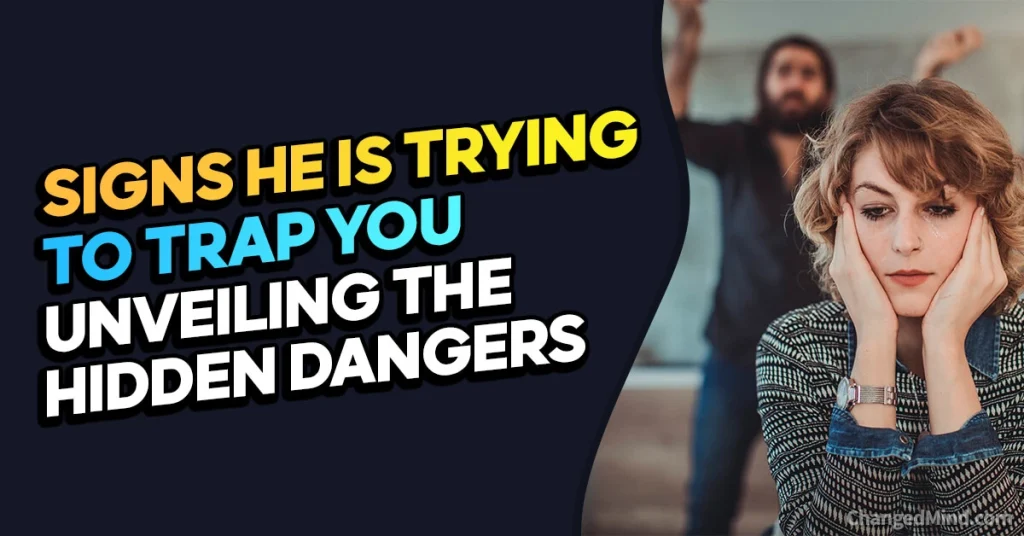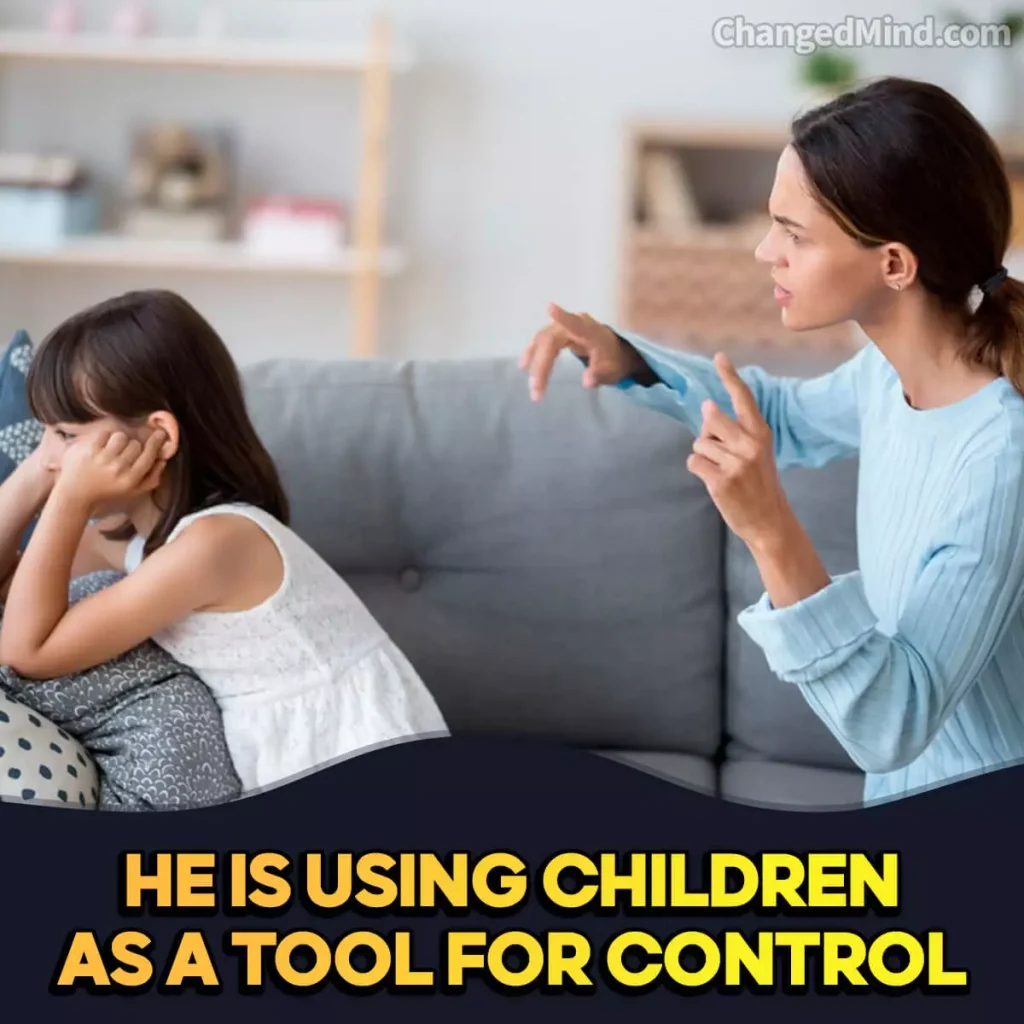Hey there! Are you wondering if your partner might be playing the role of a cunning trapper? Well, fret not, because we’ve got you covered.
In this article, we’ll dive into the sneaky signs to watch out for—those telltale signals that he’s trying to trap you. From manipulation to isolation, we’ll uncover the truth and arm you with the knowledge to navigate these treacherous waters.
So, buckle up and let’s explore the wild world of “Signs He Is Trying To Trap You.” You won’t want to miss this!
Key points:
- Excessive control and manipulation
- Gaslighting and undermining your reality
- Isolation and sabotaging your support system
- Sexual coercion and boundary violations
- Exploitation of vulnerabilities and past trauma
- The importance of seeking support and professional help
Imagine this: you’re in a relationship that starts off seemingly perfect, like a scene from a romantic comedy. But as time goes on, you begin to sense something isn’t quite right. Your partner’s actions start to feel suffocating, controlling, and manipulative. You find yourself questioning your own sanity and independence. What’s happening? Well, my friend, you might just be caught in a trap.

In relationships, trapping is a disturbing phenomenon where one partner exerts power and control over the other, leading to a toxic and unhealthy dynamic. It’s essential to recognize the signs indicating that your partner might be trying to trap you. By understanding these signs, you can protect yourself and make informed decisions about your well-being.
So, buckle up as we delve into the treacherous territory of trapping in relationships and uncover the telltale signs that your partner may be attempting to ensnare you.
16 Alarming Signs He Is Trying to Trap You

Here are 16 signs that your partner may be trying to trap you, along with brief explanations for each:
- Extreme Jealousy and Possessiveness: They exhibit excessive jealousy and control over your interactions, isolating you from friends and family.
- Isolating from Supportive Resources and Information: They restrict your access to information, such as books, internet, or social media, limiting your personal growth and independence.
- Using Children as a Tool for Control: They manipulate or use your children to control and manipulate you emotionally.
- Forced Dependency and Sabotaging Independence: They aim to make you dependent on them by hindering your career or personal growth.
- Unpredictable Mood Swings and Emotional Volatility: They have erratic emotional behavior, creating an unstable environment that affects your emotional well-being.
- Withholding Affection and Love as a Form of Control: They use affection and love as tools for manipulation and control, impacting your self-worth and emotional health.
- Forced Intimacy and Sexual Coercion: They engage in forced intimacy or sexual coercion, disregarding your consent and boundaries.
- Discrediting Your Reality and Gaslighting: They employ gaslighting techniques to make you doubt your own perception of reality, eroding your self-confidence.
- Exploiting Vulnerabilities and Past Trauma: They exploit your vulnerabilities and past trauma for control and manipulation.
- Sabotaging Your Support System: They sabotage your relationships with supportive friends, family, or professionals, isolating you from potential help or perspective.
- Financial Control and Restricting Freedom: They exert control over your finances, limiting your access to money and restricting your freedom.
- Emotional Abuse and Blaming: They engage in emotional abuse, constantly blaming you for their behavior or the problems in the relationship.
- Threats and Intimidation: They use threats and intimidation tactics to instill fear and maintain power and control over you.
- Violation of Boundaries: They consistently disregard your boundaries, invading your personal space and crossing emotional or physical boundaries.
- Narcissistic Tendencies and Self-Centeredness: They display narcissistic traits, constantly prioritizing their own needs and disregarding yours.
- Manipulative Mind Games and Psychological Control: They engage in manipulative mind games and psychological control, twisting situations to their advantage and keeping you off-balance.
These signs are important to recognize in order to protect yourself and maintain a healthy and respectful relationship.
Sign 1: Excessive Control and Manipulation

Controlling Your Every Move and Decision
In a healthy relationship, you should feel free to make choices and live your life according to your own desires. However, when your partner exhibits excessive control and manipulates your every move and decision, it’s a clear sign that something is amiss.
Imagine this: you want to meet up with a friend for coffee, but your partner insists on accompanying you or refuses to let you go altogether. They may constantly check your phone, emails, or social media accounts, invading your privacy and questioning your every interaction. These behaviors indicate a lack of trust and a need for dominance.
Unmasking Manipulation Tactics
Manipulative partners employ various tactics to gain power over you. They may use guilt, fear, or intimidation to manipulate your thoughts and actions. They might employ emotional blackmail, threatening to leave if you don’t comply with their demands. By undermining your confidence and self-esteem, they ensure you become dependent on their approval.
Gaslighting, another common manipulation technique, is when your partner distorts your perception of reality. They might deny things they’ve said or done, making you doubt your memory or judgment. Gaslighting is a devious method used to make you question your sanity and keep you under their control.
Excessive control and manipulation erode your autonomy, leaving you feeling suffocated and trapped in a relationship that should be nurturing and supportive.
Remember, you have the right to make your own choices and live a life free from constant monitoring and manipulation. It’s essential to recognize these red flags and take steps to protect yourself.
Sign 2: Isolation from Supportive Relationships
The Power of a Healthy Support Network
Having a strong support network of friends and family is like having a safety net beneath you. They provide emotional support, advice, and different perspectives that help you navigate life’s challenges. But when you’re in a relationship where your partner tries to isolate you from these crucial connections, it can be a sign of a trapping dynamic.
Trapping Partners and Isolation
Trapping partners often employ tactics to isolate you from your support system. They may sow seeds of doubt about your loved ones, making you question their intentions or loyalty. They might criticize your friends or family, creating a divide between you and those who care about you. By gradually cutting off these connections, they increase their control over your life.
Isolation serves their purpose by ensuring that you have no alternative sources of guidance or validation. Without the support network you once relied on, you become more reliant on your partner’s opinions and actions. It’s a strategy designed to keep you trapped in their web of control.
However, it’s crucial to recognize the importance of maintaining healthy relationships outside of your romantic partnership. Friends and family provide emotional support, help you see things from different perspectives, and offer a safe space to share your concerns. They act as a sounding board and can provide valuable insights when you need them most.
Breaking Free from Isolation
If you find yourself isolated from your support system, it’s important to take steps to reclaim those connections. Here are a few tips to help you break free from the isolation imposed by a trapping partner:
- Reach out for support: Confide in a trusted friend, family member, or counselor who can offer guidance and support.
- Rebuild connections: Reconnect with friends and family members you may have distanced yourself from. Strengthen those relationships by spending quality time together and rebuilding trust.
- Join social or community groups: Engage in activities that align with your interests and values. It’s an opportunity to meet new people and build new friendships outside of your relationship.
- Seek professional help: A therapist or counselor can provide valuable guidance and help you navigate the challenges of a trapping relationship. They can assist you in developing strategies to regain your independence and make informed decisions.
Remember, no one should have control over who you interact with or isolate you from the relationships that matter to you. Nurture and maintain those connections, as they can be instrumental in helping you break free from a trapping dynamic.
Sign 3: Emotional and Psychological Abuse

Unveiling the Hidden Wounds of Emotional Abuse
In any relationship, emotional safety is paramount. Unfortunately, some partners resort to emotional and psychological abuse as a means to control and manipulate their significant others. Understanding the various forms of emotional abuse can help you recognize when you’re being trapped in a toxic dynamic.
Gaslighting: Distorting Your Reality
Gaslighting is a particularly insidious form of emotional abuse. Picture this scenario: you vividly remember a conversation or event, but your partner adamantly denies it ever happened. They may go to great lengths to convince you that your memory is faulty, making you question your own sanity. Gaslighting chips away at your confidence, leaving you second-guessing your perception of reality.
Belittling and Humiliation
Another form of emotional abuse involves belittling and humiliation. Your partner may mock your ideas, intelligence, or appearance, making derogatory comments or undermining your self-esteem. Over time, these constant jabs erode your sense of self-worth, leaving you feeling small and powerless.
Impact on Mental Well-being
Emotional abuse takes a severe toll on your mental health. It can lead to anxiety, depression, low self-esteem, and even post-traumatic stress disorder (PTSD). The constant psychological assault can leave you feeling trapped, questioning your own worth and capabilities.
When emotional abuse occurs, remember that it is not your fault. No one deserves to be treated this way, and seeking support is essential. Surround yourself with trusted friends, family, or professionals who can offer guidance and help you navigate through the healing process.
By recognizing the signs of emotional abuse, you can take the first step towards breaking free from the clutches of a trapping relationship. Remember, your emotional well-being should never be compromised.
Sign 4: Financial Control and Dependency
Breaking Free from the Chains of Financial Control
Money is a powerful tool that can be used to control and manipulate others. In a trapping relationship, a partner may exert financial control and create dependency, further solidifying their power over you.
The Grip of Financial Control
A trapping partner might control the finances by restricting your access to money or dictating how it should be spent. They may monitor your expenses, demand detailed explanations for every purchase, or even take complete control of all financial transactions. This manipulation tactic serves to limit your independence and make you reliant on them for your basic needs.
The Implications of Financial Dependency
Financial dependency can have profound implications, making it difficult to break free from a trapping relationship. Some of the consequences include:
- Limited options: When you rely solely on your partner for financial support, it becomes challenging to explore alternatives or make independent choices. This restriction leaves you feeling trapped and unable to envision a future without them.
- Fear of poverty: A trapping partner may use the fear of poverty to keep you locked in the relationship. They may threaten to withhold financial resources, leaving you with a sense of helplessness and insecurity.
- Obstacles to leaving: Financial control can be a major barrier to leaving an abusive or trapping relationship. Without access to money, you may struggle to secure housing, legal representation, or even basic necessities.
Regaining Financial Independence
Reclaiming your financial independence is a crucial step towards breaking free from a trapping partner. Here are some strategies to help you regain control:
- Create a separate financial identity: Open a bank account in your name only and ensure you have access to your own funds. This step will provide a safety net and a sense of autonomy.
- Educate yourself: Gain financial knowledge and skills to manage your money effectively. Seek resources, attend workshops, or consult a financial advisor if necessary. Empowering yourself with financial literacy can increase your confidence and ability to make independent decisions.
- Build a support network: Reach out to organizations or support groups that provide assistance to individuals in abusive or trapping relationships. They can offer guidance, resources, and practical advice on navigating the financial aspects of leaving the relationship.
Remember, financial control is a significant red flag that indicates a trapping dynamic. By taking steps towards financial independence, you can regain control of your life and pave the way for a brighter future.
Sign 5: Threats and Intimidation
Unmasking the Tactics of Threats and Intimidation
In a healthy and loving relationship, you should feel safe, respected, and free from fear. However, in a trapping relationship, threats and intimidation become tools used by one partner to control the other.
Explicit and Implied Threats
Threats can take various forms, both explicit and implied. Your partner may directly threaten you with physical harm, emotional consequences, or the destruction of your reputation. They might use words or gestures to instill fear and gain compliance.
Implied threats are more subtle but equally damaging. For example, they might hint at self-harm or suicide if you try to leave the relationship. These manipulative tactics play on your emotions, making you feel responsible for their well-being and trapped in the relationship.
The Role of Intimidation
Intimidation is a powerful tool used to maintain control in a trapping dynamic. Your partner may employ tactics such as glaring, shouting, or slamming objects to create a sense of fear and power imbalance. Intimidation aims to suppress your voice, ensuring compliance out of fear of the consequences.
By employing threats and intimidation, a trapping partner seeks to manipulate and dominate, eroding your sense of self and keeping you trapped in the toxic relationship.
Breaking Free from the Cycle of Threats and Intimidation
Recognizing threats and intimidation is crucial for reclaiming your power and breaking free from a trapping partner. Here are a few steps you can take:
- Safety first: If you are in immediate danger, prioritize your safety and seek help from authorities or local organizations that specialize in domestic violence and abuse.
- Build a support system: Reach out to trusted friends, family, or support groups who can provide emotional support and guidance. Share your experiences and seek their advice on how to navigate the situation.
- Seek professional help: A therapist or counselor with experience in abusive relationships can provide you with the tools and strategies to break free from the cycle of threats and intimidation. They can help you rebuild your self-esteem and create a plan for your safety and well-being.
Remember, threats and intimidation have no place in a healthy relationship. You deserve to be treated with respect and dignity. By recognizing these signs, seeking support, and taking action, you can break free from the trapping dynamic and create a life filled with safety and happiness.
Sign 6: Constant Surveillance and Monitoring
Invasion of Privacy: The Trapping Partner’s Watchful Eye
In a healthy relationship, trust and respect for each other’s privacy are essential. However, in a trapping relationship, one partner may go to great lengths to invade your privacy and constantly monitor your activities.
The Intrusion of Constant Surveillance
A trapping partner may employ various tactics to surveil and monitor your every move. They might:
- Track your digital footprint: Constantly checking your phone, social media accounts, or emails without your consent.
- Question your whereabouts: Demanding detailed information about your daily activities, who you interact with, and where you go.
- Install tracking devices: Secretly placing GPS trackers on your car or monitoring your online activities through spyware.
These constant intrusions into your personal life erode your sense of privacy and autonomy, leaving you feeling trapped and under constant scrutiny.
Impact on Freedom and Autonomy
Constant surveillance and monitoring have a profound impact on your sense of freedom and autonomy within the relationship. You may feel like you’re walking on eggshells, afraid to make a move or have a private moment without scrutiny. This loss of personal space can lead to feelings of suffocation and a diminished sense of self.
Moreover, the constant surveillance may cause you to modify your behavior out of fear of triggering your partner’s anger or jealousy. It restricts your ability to make independent choices, maintain personal relationships, and engage in activities that bring you joy.
Reclaiming Your Privacy and Autonomy
Recognizing the signs of constant surveillance is crucial for breaking free from a trapping relationship. Here are steps you can take to regain your privacy and autonomy:
- Set boundaries: Establish clear boundaries with your partner regarding privacy and personal space. Communicate your need for trust and respect, and assert your right to privacy.
- Secure your devices: Take measures to protect your digital privacy by using strong passwords, enabling two-factor authentication, and regularly checking for any suspicious activities on your devices.
- Seek support: Reach out to trusted friends, family, or professionals who can provide guidance and support as you navigate the challenges of a trapping relationship. They can help you develop strategies to regain your independence and create a plan for your safety and well-being.
Remember, your privacy is a fundamental right that should be respected in any relationship. By reclaiming your privacy and autonomy, you can break free from the constant surveillance and create a life where you feel safe and respected.
Sign 7: Extreme Jealousy and Possessiveness
The Green-Eyed Monster: Jealousy and Possessiveness
Jealousy is a complex emotion that can arise in any relationship. However, when jealousy reaches extreme levels and is coupled with possessiveness, it can be a sign of trapping behavior. Understanding the impact of excessive jealousy is crucial for maintaining healthy relationship dynamics.
Excessive Jealousy as a Red Flag
Extreme jealousy often stems from deep insecurities within the individual experiencing it. A trapping partner may exhibit possessive behavior, constantly questioning your interactions with others, becoming overly suspicious, or displaying signs of unwarranted jealousy. They may even try to control who you spend time with or become enraged at innocent interactions.
These behaviors are not a sign of love, but rather a means of exerting control over you. They undermine trust and create a toxic atmosphere that can leave you feeling suffocated and trapped.
The Negative Effects of Jealousy on Trust
Jealousy erodes trust, which is the foundation of any healthy relationship. Constant suspicions and accusations can lead to constant tension, arguments, and a breakdown of open communication. Over time, this can create a cycle of jealousy and insecurity that destroys the connection between partners.
Moreover, extreme jealousy can isolate you from friends, family, and other potential support networks. Your partner’s possessive behavior may make you feel guilty or fearful of forming meaningful relationships outside of the romantic one, further reinforcing the trapping dynamic.
Nurturing Healthy Relationship Dynamics
In a healthy relationship, trust and open communication are key. Here are some tips for nurturing healthy relationship dynamics:
- Establish clear boundaries: Communicate openly with your partner about what is acceptable and what crosses the line. Respect each other’s personal space and friendships.
- Build trust through communication: Regularly engage in open and honest conversations about your feelings, insecurities, and concerns. This can help alleviate unnecessary jealousy and strengthen the bond between you.
- Encourage individuality: Recognize and respect each other’s independence and personal interests. Encouraging personal growth and pursuing individual passions can enhance the relationship rather than threaten it.
- Seek professional help if needed: If jealousy and possessiveness persist despite efforts to address them, consider seeking couples therapy or individual counseling. A qualified professional can provide guidance and strategies for managing and overcoming these challenges.
Remember, a healthy relationship is built on trust, mutual respect, and the freedom to maintain individuality. Excessive jealousy and possessiveness are warning signs of a trapping relationship. By addressing these issues and fostering healthy dynamics, you can create a relationship that is nurturing, supportive, and free from the chains of control.
Sign 8: Isolating from Supportive Resources and Information
Cutting off Access: The Trapping Partner’s Control
In a healthy relationship, access to supportive resources and information is crucial for personal growth and education. However, a trapping partner may intentionally restrict your access to these resources as a means of maintaining control over you.
Restricting Access to Information
A trapping partner may employ various tactics to isolate you from supportive resources and information. They might:
- Limit internet access: Monitoring and controlling your online activities, restricting your access to information, and censoring what you can and cannot read or learn.
- Discourage personal growth: Belittling your interests, undermining your aspirations, and discouraging you from seeking knowledge or pursuing education.
- Isolate from supportive networks: Actively preventing you from connecting with supportive friends, family members, or communities, thereby limiting your exposure to alternative perspectives and potential sources of assistance.
By isolating you from supportive resources and information, a trapping partner aims to create a dependence on their own perspectives and control over your thoughts and actions.
The Importance of Access to Resources
Having access to resources for personal growth and education is essential for your well-being and development. These resources can empower you to build self-confidence, broaden your horizons, and foster independence. They can provide valuable insights, knowledge, and support systems that help you navigate life’s challenges.
Access to information is also vital for understanding healthy relationship dynamics and recognizing warning signs of trapping behavior. When you have access to resources and information, you can make informed decisions and seek help when needed.
Breaking Free from Isolation
Recognizing the signs of isolation and reclaiming access to supportive resources is a crucial step toward breaking free from a trapping relationship. Here are some steps you can take:
- Educate yourself: Seek out information, books, and articles that provide insights into healthy relationships, red flags, and ways to empower yourself. Knowledge is power, and by educating yourself, you can gain a better understanding of your situation and the tools for change.
- Connect with supportive networks: Reach out to supportive friends, family, or communities who can offer guidance and emotional support. Surrounding yourself with people who uplift and validate your experiences can provide the strength needed to break free from isolation.
- Utilize online resources: Explore credible online platforms, forums, and organizations that focus on supporting individuals in toxic relationships. These resources often provide valuable information, strategies, and helpline contacts for those seeking help.
Remember, you have the right to access supportive resources and information that can empower you. Breaking free from isolation is a significant step toward regaining control over your own life and finding support as you navigate your journey toward healing and freedom.
Sign 9: Using Children as a Tool for Control

Innocence Exploited: Children as Pawns in a Trapping Relationship
In a healthy relationship, children should be nurtured and protected, with their well-being prioritized. However, in a trapping relationship, a partner may exploit the presence of children to gain control and manipulate your emotions.
Manipulation and Emotional Warfare
A trapping partner may use various tactics involving children to control and manipulate you. These tactics can include:
- Threatening custody battles: Manipulating the fear of losing custody or access to your children as a means to control your actions and decision-making.
- Alienating and turning children against you: Poisoning the children’s perception of you, spreading false information, or encouraging them to side with the trapping partner, leading to parental alienation.
- Using children as leverage: Manipulating visitation schedules, access to the children, or child support as tools for control and coercion.
By using children as a tool for control, a trapping partner seeks to undermine your confidence, create emotional distress, and maintain power over your life.
The Harmful Impact on You and the Children
The use of children as a means of control can have severe and long-lasting consequences for both you and the children involved. Some of the impacts include:
- Emotional trauma: Constant manipulation and emotional warfare can lead to significant emotional distress for you. The stress and anxiety caused by these tactics can affect your mental well-being and overall quality of life.
- Strained parent-child relationships: When children are used as pawns, their relationships with both parents may suffer. They may feel confused, torn, or even blame themselves for the conflict between their parents.
- Psychological damage to children: Witnessing manipulation, conflict, and the degradation of one parent by the other can have detrimental effects on children’s emotional and psychological development. It can create a toxic environment that hinders their own growth and well-being.
Protecting Yourself and Your Children
If you find yourself in a situation where your partner is using children as a tool for control, it’s important to take steps to protect yourself and your children:
- Seek legal advice: Consult with a family law attorney to understand your rights and legal options regarding custody, visitation, and child support. They can guide you through the process and help you make informed decisions.
- Document incidents: Keep a record of any instances where your partner attempts to use children as a tool for control. Document conversations, threats, or any evidence that can support your case.
- Build a support network: Reach out to trusted friends, family members, or support groups who can offer emotional support and guidance throughout this challenging time.
- Focus on the well-being of your children: Prioritize the needs and well-being of your children. Shield them from the conflict as much as possible and encourage healthy, positive relationships with both parents.
Remember, using children as a tool for control is not only harmful but also manipulative and abusive. By taking steps to protect yourself and your children, you can break free from the trapping dynamics and create a healthier, more stable environment for everyone involved.
Sign 10: Forced Dependency and Sabotaging Independence

Trapped in Dependency: When Independence is Sabotaged
In a healthy relationship, both partners support each other’s personal growth and encourage independence. However, in a trapping relationship, one partner may employ tactics aimed at forcing dependency and sabotaging your independence.
Behaviors Aimed at Dependency
A trapping partner may exhibit various behaviors with the intention of making you dependent on them. These behaviors can include:
- Financial control: Taking control of your finances, restricting access to money, or pressuring you to rely solely on their financial support.
- Undermining your confidence: Constantly criticizing your abilities, belittling your achievements, and eroding your self-esteem to make you doubt your capabilities.
- Isolating you: Actively cutting you off from friends, family, and support networks, leaving you with limited resources and relying solely on the trapping partner for companionship and support.
- Hindering personal growth: Sabotaging your educational or career pursuits, discouraging you from pursuing your passions, or undermining your goals and aspirations.
By creating a sense of dependency, the trapping partner gains control over your decisions, actions, and overall life.
Instances of Sabotage
Sabotage is a common tactic used by trapping partners to hinder your independence and personal growth. Some examples of sabotage may include:
- Stifling career opportunities: Discouraging you from pursuing career advancement, sabotaging job opportunities, or deliberately undermining your professional reputation.
- Undermining educational pursuits: Discrediting the value of education, discouraging you from pursuing further education, or intentionally obstructing your educational endeavors.
- Restricting personal growth: Creating obstacles or discouraging you from engaging in activities that foster personal growth, such as attending workshops, joining clubs or organizations, or seeking therapy.
These acts of sabotage aim to maintain control and prevent you from gaining the confidence, skills, and resources necessary to break free from the trapping dynamics.
Reclaiming Your Independence
Recognizing and addressing forced dependency and sabotage is essential for reclaiming your independence. Here are some steps you can take:
- Build a support network: Reach out to trusted friends, family members, or support groups who can provide emotional support, guidance, and resources.
- Create a safety plan: Develop a safety plan to ensure your well-being and the well-being of any dependents involved. This may include finding a safe place to stay, accessing legal advice, and seeking assistance from domestic violence organizations.
- Focus on personal growth: Prioritize your personal growth and invest in activities that nurture your independence, such as pursuing education, developing new skills, or engaging in hobbies.
- Seek professional help: Consider consulting with a therapist or counselor who specializes in abusive relationships. They can provide valuable guidance, support, and tools for breaking free from the trapping dynamics.
Remember, you have the right to lead an independent and fulfilling life. By recognizing the signs of forced dependency and sabotage, you can take steps towards regaining your autonomy and building a future free from trapping relationships.
Sign 11: Unpredictable Mood Swings and Emotional Volatility

Riding the Emotional Rollercoaster: The Impact of Emotional Volatility
In a healthy relationship, emotional stability and consistency are vital for creating a safe and nurturing environment. However, in a trapping relationship, you may find yourself constantly navigating the unpredictable mood swings and emotional volatility of your partner.
The Rollercoaster Ride
A trapping partner’s emotional volatility can manifest in various ways. They may experience frequent and intense mood swings, ranging from extreme anger and rage to moments of apparent remorse or affection. These unpredictable shifts can create an unstable and emotionally charged environment that can leave you feeling constantly on edge and uncertain.
The Impact on Your Emotional Well-being
Living with a trapping partner who exhibits emotional volatility can take a significant toll on your emotional well-being. The constant ups and downs, coupled with the fear of triggering an outburst, can leave you feeling:
- Anxious and on guard: Walking on eggshells, afraid to say or do anything that might provoke an emotional outburst.
- Confused and bewildered: Struggling to understand and make sense of the rapid and unpredictable shifts in your partner’s emotions.
- Isolated and alone: Feeling emotionally isolated and unable to seek support due to the unpredictable nature of your partner’s reactions.
- Manipulated and controlled: The trapping partner may use their emotional volatility as a means to control and manipulate you, making it challenging to trust your own feelings and judgment.
Impaired Decision-Making
The constant emotional turmoil and instability can impair your ability to make decisions. When faced with a trapping partner’s unpredictable mood swings, you may find yourself hesitant to express your needs, voice your concerns, or make decisions that could potentially trigger an adverse reaction.
By instilling fear and uncertainty, a trapping partner can gain control over your thoughts, actions, and decisions, further entrenching the dynamics of the trapping relationship.
Seeking Support and Reclaiming Stability
Recognizing the impact of unpredictable mood swings and emotional volatility is crucial for your well-being. Here are some steps you can take:
- Educate yourself: Learn about emotional abuse, manipulation tactics, and the impact of emotional volatility. This knowledge can help you understand the dynamics at play and empower you to seek support.
- Build a support network: Connect with trusted friends, family, or professionals who can provide a safe space for you to express your emotions and concerns. Having a support network can help you regain a sense of stability and validate your experiences.
- Set boundaries: Establish clear boundaries to protect your emotional well-being. Communicate your needs and expectations assertively, and be prepared to enforce those boundaries if they are crossed.
- Consider therapy: Individual therapy can provide valuable support in navigating the emotional challenges of a trapping relationship. A therapist can help you process your emotions, regain your confidence, and develop strategies for dealing with emotional volatility.
- Focus on self-care: Prioritize self-care activities that promote emotional well-being, such as engaging in hobbies, practicing mindfulness or meditation, and engaging in activities that bring you joy and relaxation.
Remember, your emotional well-being is important, and you deserve to be in a relationship characterized by stability, respect, and emotional safety. Taking steps to seek support and regain stability can help you navigate the challenges of an emotionally volatile trapping relationship.
Sign 12: Withholding Affection and Love as a Form of Control

Love and Affection: The Power of Connection
Love and affection are fundamental to healthy relationships, providing emotional support, validation, and a sense of belonging. However, in a trapping relationship, your partner may use these very qualities as tools for manipulation and control.
The Withholding Game
A trapping partner may withhold affection and love as a means to exert power and control over you. They may:
- Give love and affection inconsistently: Your partner may alternate between showering you with affection and withdrawing it, creating a constant state of uncertainty and emotional instability.
- Use love as a reward or punishment: Your partner may withhold affection and love when you don’t meet their demands or when you attempt to assert your own needs and boundaries.
- Create dependency: By keeping affection just out of reach, your partner can make you more dependent on their approval and validation, leaving you eager to please them and maintain their love and affection.
The Impact on Your Self-Worth
Experiencing the withholding of affection and love can have a profound impact on your self-worth and emotional health. It can leave you feeling:
- Unworthy and undeserving: Constantly questioning your worthiness of love and affection, believing that you are the cause of your partner’s withdrawal.
- Insecure and anxious: Living in a perpetual state of anxiety, always striving to gain your partner’s love and approval, but never feeling secure in your connection.
- Powerless and controlled: Your partner’s manipulation through affection and love can make you feel powerless and trapped in a cycle of seeking validation.
Reclaiming Your Self-Worth and Emotional Health
Recognizing the signs of affection and love being used as a tool for control is the first step toward reclaiming your self-worth and emotional well-being. Here are some strategies to consider:
- Recognize the pattern: Reflect on the patterns of affection and love in your relationship. Are they used as rewards or punishments? Are they inconsistent and unpredictable? Identifying these patterns can help you understand the manipulative dynamics at play.
- Prioritize self-love: Focus on developing a strong sense of self-worth and self-love independent of your partner’s validation. Engage in activities that bring you joy, cultivate self-care routines, and surround yourself with supportive friends and family.
- Communicate openly: Express your needs and concerns to your partner. Let them know how their behavior is affecting you emotionally. Honest and open communication can help bring awareness to the issue and potentially initiate positive changes.
- Set healthy boundaries: Establish clear boundaries around how you expect to be treated in terms of love and affection. Communicate your boundaries assertively and be prepared to enforce them if they are disregarded.
- Seek professional support: Consider seeking therapy or counseling to help you navigate the complexities of a trapping relationship. A therapist can provide guidance, support, and tools to help you regain control of your emotional well-being.
Remember, you deserve a relationship built on mutual love, respect, and emotional support. Withholding affection and love as a form of control is not a healthy or acceptable behavior. By recognizing the signs and taking steps to reclaim your self-worth, you can begin the journey towards a more fulfilling and balanced relationship.
Sign 13: Forced Intimacy and Sexual Coercion

Boundaries and Consent: The Cornerstones of Healthy Relationships
In a healthy relationship, boundaries and consent form the foundation of mutual respect, trust, and emotional safety. However, in a trapping relationship, forced intimacy and sexual coercion may be present, undermining these crucial aspects.
Forced Intimacy: A Violation of Autonomy
Forced intimacy refers to instances where your partner disregards your boundaries and pressures or coerces you into engaging in intimate acts against your will. This can take various forms, including:
- Physical force: Your partner may physically overpower you, using physical strength or aggression to control and manipulate your involvement in intimate acts.
- Emotional manipulation: Your partner may guilt-trip, threaten, or emotionally manipulate you to engage in sexual activities, making you feel obligated or responsible for their satisfaction.
- Ignoring your consent: Your partner may dismiss your lack of consent, disregarding your verbal or non-verbal cues that indicate your discomfort or unwillingness to participate.
The Importance of Consent and Boundaries
Consent and boundaries are vital aspects of a healthy and respectful relationship. They affirm your autonomy, individuality, and right to make decisions about your own body. Here are some key points to consider:
- Consent is ongoing: Consent is not a one-time agreement but a continuous process that should be obtained freely and enthusiastically for each new sexual encounter or activity. It should never be assumed or coerced.
- Clear communication: Establish open and honest communication with your partner about your boundaries, desires, and comfort levels. Encourage your partner to do the same. This helps foster a safe and consensual environment.
- Respect for boundaries: Respect each other’s boundaries and always seek enthusiastic and affirmative consent before engaging in any sexual activity. Consent should be given willingly, without fear, pressure, or manipulation.
- Recognizing red flags: Be aware of any signs of forced intimacy or sexual coercion in your relationship. If your partner consistently disregards your boundaries or coerces you into acts you are uncomfortable with, it’s important to address the issue and consider seeking support.
- Seeking support: If you have experienced forced intimacy or sexual coercion, it can be helpful to reach out to a trusted friend, counselor, or support organization specializing in intimate partner violence. They can provide guidance, resources, and a safe space to share your experiences.
Reclaiming Your Sexual Autonomy and Well-being
If you find yourself in a trapping relationship involving forced intimacy or sexual coercion, remember that you have the right to prioritize your safety, well-being, and sexual autonomy. Here are some steps to consider:
- Seek professional help: Reach out to a therapist or counselor experienced in working with survivors of intimate partner violence. They can offer guidance, support, and strategies to help you navigate the challenges you may face.
- Develop a safety plan: Create a safety plan that outlines steps to ensure your physical and emotional well-being. This may include identifying trusted individuals, accessing safe spaces, and considering legal or protective measures.
- Build a support network: Surround yourself with a supportive network of friends, family, or support groups. Sharing your experiences with trusted individuals who believe and support you can be instrumental in your healing journey.
- Prioritize self-care: Engage in activities that promote self-care, self-love, and emotional healing. This may involve seeking professional help, engaging in creative outlets, practicing mindfulness, or participating in support groups.
Remember, a healthy and consensual sexual relationship is built on mutual respect, communication, and the recognition of boundaries. Forced intimacy and sexual coercion have no place in a loving and respectful partnership. Prioritize your well-being and seek the support you deserve to break free from the traps that hold you back.
Sign 14: Discrediting Your Reality and Gaslighting

Gaslighting: Manipulation and Distortion of Reality
Gaslighting is a form of psychological manipulation where a trapping partner seeks to discredit your perception of reality, making you doubt your own thoughts, feelings, and experiences. Gaslighting techniques can be subtle yet highly effective in undermining your confidence and eroding your sense of self.
Recognizing Gaslighting Techniques
Gaslighting can manifest in various ways, with the aim of making you question your sanity and reality. Here are some common gaslighting techniques to be aware of:
- Denial of events: Your partner may deny or dismiss incidents that you clearly remember happening, making you doubt the validity of your own memories.
- Minimization and trivialization: Your partner may downplay the significance of your emotions or concerns, making you feel as if your feelings are unwarranted or exaggerated.
- Blaming and shifting responsibility: Your partner may shift blame onto you for their own actions or behaviors, making you question your own culpability and reinforcing a sense of guilt or shame.
- Twisting the facts: Your partner may distort or manipulate information to create confusion or alter the narrative, making it difficult for you to trust your own judgment.
- Invalidation and belittlement: Your partner may dismiss your opinions, needs, or experiences, undermining your self-worth and making you feel insignificant or unimportant.
The Psychological Impact of Gaslighting
Gaslighting can have severe psychological consequences, leaving lasting effects on your mental well-being and self-confidence. Some common impacts of gaslighting include:
- Self-doubt and confusion: Gaslighting can make you question your sanity and judgment, leading to self-doubt and confusion about your own thoughts and experiences.
- Erosion of self-esteem: Constantly being told that your feelings and perceptions are invalid can chip away at your self-esteem, leaving you feeling inadequate and unsure of yourself.
- Isolation and dependency: Gaslighting often seeks to isolate you from friends, family, or support networks, making you reliant on the trapping partner for validation and a sense of reality.
- Anxiety and depression: The constant manipulation and doubt imposed by gaslighting can contribute to feelings of anxiety, depression, and a diminished sense of overall well-being.
- Difficulty making decisions: Gaslighting can undermine your ability to trust your own judgment, making it challenging to make decisions without seeking external validation or approval.
Reclaiming Your Reality and Restoring Self-Confidence
If you suspect that you are a victim of gaslighting, it’s essential to take steps to protect your mental well-being and regain your sense of self. Here are some strategies to consider:
- Educate yourself: Learn about gaslighting and its techniques to gain awareness and recognize when they are being used against you.
- Trust your instincts: Trust your gut instincts and intuition. If something feels off or doesn’t align with your own reality, honor those feelings and seek validation from trusted sources.
- Seek support: Reach out to friends, family, or a therapist who can provide a safe space to discuss your experiences and offer objective perspectives.
- Document incidents: Keep a journal documenting instances of gaslighting, including dates, descriptions, and any evidence that supports your version of events. This can help validate your experiences and provide a record for future reference.
- Set boundaries: Establish clear boundaries with your partner and communicate your needs and expectations. Asserting your boundaries can help protect your sense of self and prevent further gaslighting attempts.
- Practice self-care: Engage in activities that promote self-care, self-love, and emotional healing. Focus on rebuilding your self-esteem and surrounding yourself with positive influences.
Remember, you deserve to be in a relationship where your reality is respected and your feelings are validated. Gaslighting is a form of emotional abuse that undermines your well-being. Take steps to reclaim your reality, regain your confidence, and build a life free from manipulation.
Sign 15: Exploiting Vulnerabilities and Past Trauma

Manipulating Vulnerabilities for Control
A trapping partner may exploit your vulnerabilities and past trauma as a means of gaining control over you. This insidious tactic involves using your weaknesses against you to manipulate your emotions, decisions, and actions. By preying on your vulnerabilities, they aim to establish power dynamics that keep you trapped in the relationship.
Recognizing Exploitation of Vulnerabilities
It’s crucial to be aware of the ways in which a trapping partner may exploit your vulnerabilities. Here are some common strategies they might employ:
- Emotional manipulation: Your partner may use your emotional vulnerabilities, such as insecurities or fears, to control and manipulate your feelings. They may exploit your need for validation or affection to keep you dependent on their approval.
- Triggering past traumas: A trapping partner may deliberately trigger your past traumas, knowing it will destabilize you emotionally and mentally. By reopening old wounds, they create an environment where you feel reliant on them for comfort and support.
- Isolating you from support: Exploiting your vulnerabilities often involves isolating you from friends, family, or resources that could provide a support network. They may undermine your relationships or create a sense of dependency, making it harder for you to seek help or break free.
- Playing the savior role: A trapping partner might exploit your vulnerabilities by positioning themselves as your savior or protector. They may use this role to foster a reliance on them for emotional support, making it difficult for you to assert your independence or make decisions without their involvement.
The Importance of Healing and Seeking Support
Recognizing the exploitation of your vulnerabilities is a significant step toward breaking free from the trapping dynamic. Here are some essential actions to consider:
- Self-reflection and healing: Take time to reflect on your vulnerabilities and past traumas. Engage in self-care activities, therapy, or support groups to address and heal from your emotional wounds. Prioritizing your well-being is crucial for reclaiming your strength and resilience.
- Building a support network: Reach out to trusted friends, family, or professionals who can offer support and guidance. Surrounding yourself with people who genuinely care about your well-being can help you regain confidence and provide a safety net as you navigate the path to freedom.
- Setting boundaries: Establish clear boundaries with your trapping partner. Communicate your limits and expectations, and firmly assert your right to be treated with respect and dignity. Setting boundaries is an essential step in reclaiming your power and preventing further exploitation.
- Educating yourself: Learn about manipulation techniques, trauma bonding, and the dynamics of healthy relationships. This knowledge will empower you to identify red flags and make informed decisions about your well-being.
- Seek professional help: If you find it challenging to navigate this journey alone, consider reaching out to a therapist or counselor experienced in abusive relationships. They can provide guidance, support, and strategies to help you regain control of your life.
Breaking Free from the Traps
Breaking free from a trapping relationship requires courage, support, and a commitment to your own well-being. Remember, you are not defined by your vulnerabilities or past traumas. By addressing your wounds, seeking support, and learning to trust yourself again, you can reclaim your autonomy and build a future free from exploitation and control.
Sign 16: Sabotaging Your Support System
Undermining Your Relationships
In a trapping relationship, it’s not uncommon for a partner to sabotage your connections with supportive friends, family, or professionals. This manipulation tactic aims to isolate you and make you dependent solely on the trapping partner for guidance, validation, and perspective.
Recognizing Sabotage of Your Support System
It’s essential to be aware of the ways in which a trapping partner may try to sabotage your relationships. Here are some common tactics they might employ:
- Spreading false information: Your partner may spread rumors, falsehoods, or negative narratives about your friends, family, or support system. By undermining their credibility, they aim to erode your trust and confidence in those who could offer help or perspective.
- Creating conflict: A trapping partner might deliberately create conflicts or misunderstandings between you and your support network. They may use manipulation tactics, such as gaslighting or triangulation, to sow seeds of doubt and discord in your relationships.
- Forcing ultimatums: Your partner may present you with ultimatums that force you to choose between them and your support system. By pressuring you to sever ties with those who care about you, they aim to isolate you and ensure their control over your thoughts and actions.
- Discouraging professional help: A trapping partner may discourage you from seeking help from therapists, counselors, or other professionals who can provide objective guidance. They might belittle their expertise, dismiss their opinions, or create a narrative that portrays seeking outside help as a betrayal.
The Impact of Isolation
The isolation imposed by a trapping partner can have severe consequences for your well-being. Here are some of the impacts you may experience:
- Loss of perspective: When you’re cut off from your support system, it becomes challenging to gain objective perspectives on your relationship. You may lose sight of what is healthy and normal, making it easier for the trapping partner to maintain their control.
- Increased dependency: By sabotaging your support system, the trapping partner aims to make you dependent solely on them for emotional, financial, and practical needs. This dependency strengthens their power and makes it harder for you to break free.
- Limited resources and help: Isolation can leave you without access to crucial resources and help that could aid in your journey towards freedom. Friends, family, and professionals can offer guidance, practical support, and emotional validation, all of which are vital when escaping a trapping relationship.
Rebuilding Your Support Network
Recognizing the sabotage of your support system is a crucial step towards reclaiming your independence. Here are some essential actions to consider:
- Reach out to trusted individuals: Seek out the support of friends, family, or professionals you trust. Share your experiences, concerns, and fears with them. Their validation and empathy can help restore your confidence and provide guidance as you navigate your path to freedom.
- Build new connections: If your support system has been severely compromised, focus on building new connections with people who can offer empathy, understanding, and support. Seek out support groups, online communities, or local organizations that can provide a safe space for healing and growth.
- Educate yourself: Learn about healthy relationships, boundaries, and the dynamics of emotional abuse. This knowledge will empower you to identify red flags, protect yourself from further manipulation, and make informed decisions about rebuilding your support system.
- Consider professional help: Therapists, counselors, and support organizations specializing in abusive relationships can offer valuable guidance and resources. They can help you heal from the trauma, regain your self-esteem, and develop strategies for rebuilding your life.
Reclaiming Your Independence
While the sabotage of your support system may have left you feeling isolated and vulnerable, remember that you have the strength and resilience to rebuild and reclaim your independence. By seeking support, educating yourself, and cultivating new connections, you can break free from the trapping dynamic and create a life filled with healthy relationships and personal growth.
Conclusion
Throughout this article, we have explored the crucial signs that indicate a partner may be trying to trap you in a toxic and controlling relationship. By understanding these signs, you can better recognize the red flags and take steps to protect yourself. Let’s recap the key signs discussed:
- Sign 1: Excessive Control: Your partner exhibits controlling behaviors, such as monitoring your activities, isolating you from loved ones, or dictating your choices.
- Sign 2: Manipulation and Gaslighting: Your partner uses manipulation tactics and gaslighting techniques to undermine your sense of reality, making you doubt your own perceptions and experiences.
- Sign 3: Emotional and Psychological Abuse: You experience emotional abuse, such as constant criticism, belittlement, or threats, which erode your self-esteem and emotional well-being.
- Sign 4: Financial Control: Your partner exercises control over your finances, restricts your access to money, or manipulates you through financial means.
- Sign 5: Isolation from Support Systems: Your partner isolates you from friends, family, or supportive resources, making you dependent on them for guidance and validation.
- Sign 6: Exploitation and Violation of Boundaries: Your partner exploits your vulnerabilities and past trauma for their own gain, disregarding your boundaries and well-being.
- Sign 7: Extreme Jealousy and Possessiveness: Your partner displays excessive jealousy and possessiveness, creating an environment of mistrust and stifling your independence.
- Sign 8: Isolating from Supportive Resources and Information: Your partner restricts your access to information, such as books, internet, or social media, hindering your personal growth and education.
- Sign 9: Using Children as a Tool for Control: Your partner manipulates or uses children to control you, causing harm to both you and the children involved.
- Sign 10: Forced Dependency and Sabotaging Independence: Your partner engages in behaviors aimed at making you dependent on them and sabotages your career or personal growth.
- Sign 11: Unpredictable Mood Swings and Emotional Volatility: Your partner’s emotional volatility creates an unstable environment, impacting your emotional well-being and decision-making.
- Sign 12: Withholding Affection and Love as a Form of Control: Your partner uses affection and love as tools for manipulation and control, affecting your self-worth and emotional health.
- Sign 13: Forced Intimacy and Sexual Coercion: Your partner engages in forced intimacy or sexual coercion, violating your boundaries and disregarding consent.
- Sign 14: Discrediting Your Reality and Gaslighting: Your partner employs gaslighting techniques to make you doubt your own perception of reality, eroding your self-confidence.
- Sign 15: Exploiting Vulnerabilities and Past Trauma: Your partner exploits your vulnerabilities and past trauma for control, impacting your well-being and decision-making.
- Sign 16: Sabotaging Your Support System: Your partner sabotages your relationships with supportive friends, family, or professionals, isolating you from those who could offer help or perspective.
It’s important to remember that you don’t have to face these challenges alone. Seeking support from trusted individuals and professionals is vital in breaking free from a trapping relationship. Here are some key steps to consider:
- Reach out for support: Share your experiences with friends, family, or professionals who can offer guidance, empathy, and validation.
- Seek professional help: Therapists, counselors, and support organizations specializing in abusive relationships can provide invaluable assistance in healing from the trauma and developing strategies for escape.
- Educate yourself: Learn about healthy relationships, boundaries, and the dynamics of abuse to empower yourself with knowledge and recognize the warning signs.
- Build a support network: Cultivate new connections with individuals and communities that prioritize your well-being and provide understanding and support.
- Prioritize self-care: Focus on healing and self-care by engaging in activities that bring you joy, practicing self-compassion, and setting boundaries to protect your emotional and physical well-being.
Remember, breaking free from a trapping relationship takes courage and time. It’s a journey towards reclaiming your independence and creating a life filled with healthy relationships and personal growth. By recognizing and addressing trapping behaviors, you are taking the first step towards a brighter future.
Stay strong, seek support, and know that you deserve to be in a relationship that is built on love, respect, and mutual growth. You have the power to break free and create a life filled with happiness and fulfillment.
Key Takeaways
- Look for warning signs such as excessive control, manipulation, and emotional abuse.
- Gaslighting can make you doubt your own reality—trust your instincts.
- Forced intimacy and sexual coercion are violations of boundaries and consent.
- Seek support and professional help to navigate a trapping relationship.
- Protect yourself by maintaining connections with a supportive network.
FAQs: Signs He Is Trying To Trap You
What are some warning signs of a trapping partner?
Warning signs include excessive control, manipulation, emotional abuse, isolation, financial control, and exploitation. Look out for red flags in your relationship.
How can gaslighting affect your perception of reality?
Gaslighting can make you doubt your own perception of reality by manipulating facts, distorting the truth, and undermining your confidence in your own experiences and memories.
What impact can forced intimacy and sexual coercion have on a person?
Forced intimacy and sexual coercion violate boundaries and disregard consent, leading to emotional and physical harm. It erodes trust, self-esteem, and the ability to form healthy relationships.
Why is it important to seek support and professional help in a trapping relationship?
Seeking support and professional help provides guidance, validation, and resources to help you navigate the challenges of a trapping relationship and facilitate your healing and growth.
How can I protect myself from a trapping partner’s efforts to sabotage my support system?
Stay connected with supportive friends, maintain communication with trusted family members, and seek professional assistance. Building a strong support network helps counteract the isolation tactics of a trapping partner.







